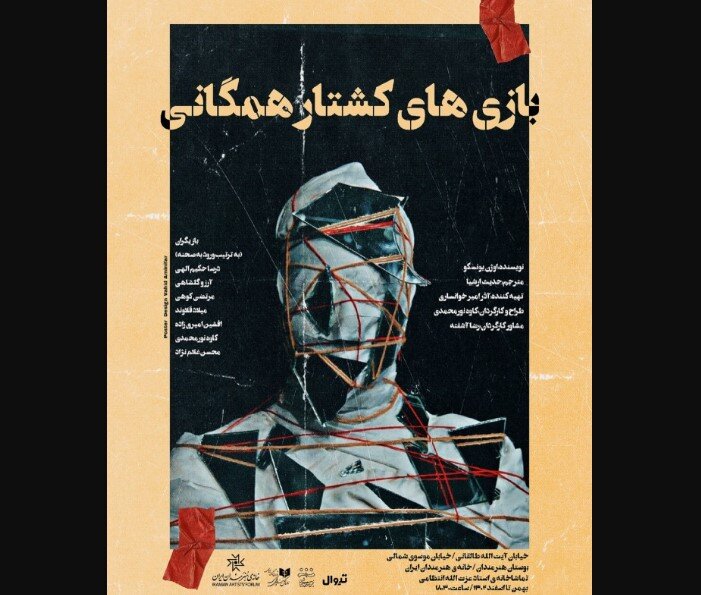“The Killing Game” on stage at Tehran theater

TEHRAN-An Adaptation of renowned French-Romanian playwright Eugène Ionesco’s play “The Killing Game” is on stage at Entezami Hall of the Iranian Artists Forum (IAF) in Tehran.
Kaveh Nurmohammadi is the director of the play, which has been translated by Hadith Arshia.
Dorsa Hakimollahi, Arezou Golshahi and Morteza Kouhi are the main members of the cast for the play, which will remain on stage until March 8.
“Jeux de Massacre”, known in English as “The Killing Game” or “Here Comes a Chopper”, is a play that delves into the theme of an epidemic and its repercussions on society. Premiered in 1970 at the Théâtre Montparnasse, the play paints a grim picture of a city ravaged by a deadly plague.
The quick sketches presented in the play showcase the varied reactions of different societal groups including peasants, wealthy bourgeois, intellectuals, doctors, and the poor as they grapple with the devastating effects of the epidemic.
Politics also plays a significant role in the narrative, as party members seek to exploit the plague for their own gain, highlighting the opportunistic nature of those in power. As the epidemic escalates and fear grips the city, the boundaries between social classes blur as everyone becomes united in their fear of contamination.
The play escalates to a climactic point where fire consumes the entire city, symbolically cleansing it of the chaos and disorder brought on by the epidemic. This fiery destruction ultimately restores a sense of order and resolution to the once-stricken community.
The play presents a chilling portrayal of the impact of a deadly epidemic on society, showcasing the fragility and interconnectedness of humanity in the face of a common threat. Through its dark and thought-provoking narrative, the play serves as a powerful commentary on the human condition and the way in which fear and tragedy can unite or divide us.
Eugène Ionesco was a renowned Romanian-French playwright and dramatist known for his contributions to the Theatre of the Absurd. Born in 1909 in Slatina, Romania, Ionesco grew up during a tumultuous period in European history, witnessing the rise of fascism and the horrors of World War II. His experiences during this time greatly influenced his work, leading him to explore themes of isolation, alienation, and the absurdity of human existence in his plays. Ionesco's most famous works include “The Bald Soprano,” “Rhinoceros,” and “The Chairs,” which exemplify his unique style characterized by nonsensical dialogue, illogical situations, and a sense of existential dread.
Throughout his career, Ionesco challenged traditional theatrical conventions and pushed the boundaries of storytelling, earning him a reputation as a trailblazer in the world of theater. His plays often feature ordinary characters caught in surreal and absurd situations, highlighting the absurdity of everyday life and the inscrutable nature of human communication. Ionesco's work continues to be celebrated for its innovative approach to drama and its profound exploration of the human condition, solidifying his place as one of the most influential playwrights of the 20th century.
SAB/
Leave a Comment